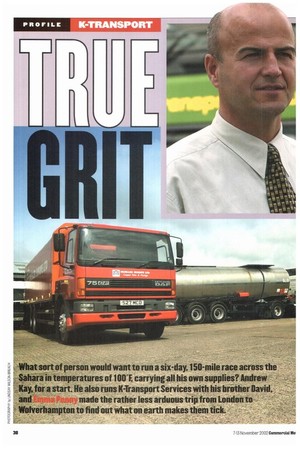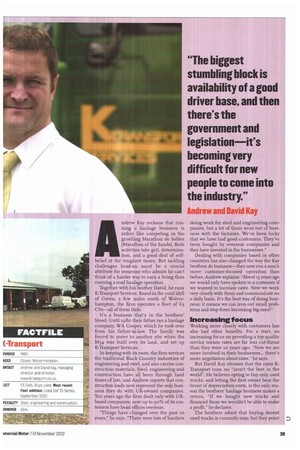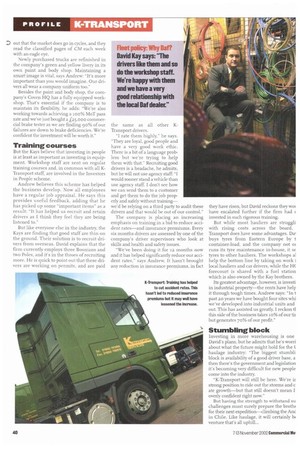hat sort of person would want to run a six-day,
Page 38

Page 39

Page 40

If you've noticed an error in this article please click here to report it so we can fix it.
150-mile race across the Sahara in temperatures of 100°F, carrying all his own supplies? Andrew . Kay, for a start. He also runs If-Transport Services with his brother David, z , and made the rather less arduous trip from London to g Wolverhampton to find out what on earth makes them tick. ...r, 8
Andrew Kay reckons that running a haulage business is rather like competing in the gruelling Marathon de Sables (Marathon of the Sands). Both activities take grit, determination, and a good deal of selfbelief at the toughest times. But tackling challenges head-on must be a crucial attribute for someone who admits he can't think of a harder way to earn a living than running a road haulage operation.
Together with his brother David, he runs K-Transport Services. Based in the rural idyll of Coven, a few miles north of Wolverhampton, the firm operates a fleet of 63 CVs—all of them Dafs.
It's a business that's in the brothers' blood. Until 1980 their father ran a haulage company, WA Cooper, which he took over from his father-in-law. The family was forced to move to another site when the M54 was built over its land, and set up K-Transport Services,
In keeping with its roots, the firm services the traditional Black Country industries of engineering and steel, and also carries construction materials. Steel, engineering and construction have all been through hard times of late, and Andrew reports that construction loads now represent the only business they do with UK-owned companies. Ten years ago the firm dealt only with UKbased companies; now up to 90% of its customers have head offices overseas.
"Things have changed over the past TO years," he says. "There were lots of hauliers
doing work for steel and engineering companies, but a lot of them went out of business with the factories. We've been lucky that we have had good customers. They've been bought by overseas companies and they have invested in the businesses.'
Dealing with companies based in other countries has also changed the way the Kay brothers do business—they now run a much more customer-focused operation than before, Andrew explains: 'About 15 years ago we would only have spoken to a customer if we wanted to increase rates. Now we work very closely with them and communicate on a daily basis. It's the best way of doing business; it means we can iron out small problems and stop them becoming big ones!"
Increasing focus
Working more closely with customers has also had other benefits. For a start, an increasing focus on providing a top quality service means rates are far less cut-throat than they were io years ago. Now we are more involved in their businesses._ there's more negotiation about rates," he says.
But David Kay stresses that the rates KTransport runs on "aren't the best in the world". He believes opting to buy only used trucks, and letting the first owner bear the brunt of depreciation costs, is the only reason the brothers' haulage business makes a return. "If we bought new trucks and financed them we wouldn't be able to make a profit," he declares.
The brothers admit that buying decent used trucks is currently easy, but they point
out that the market does go in cycles, and they read the classified pages of CM each week with an eagle eye.
Newly purchased trucks are refinished in the company's green and yellow livery in its own paint and body shop. Maintaining a smart image is vital, says Andrew: its more important than you would imagine. Our drivers all wear a company uniform too."
Besides the paint and body shop, the company's Coven HQ has a frilly equipped workshop. That's essential if the company is to maintain its flexibility, he adds: "We're also working towards achieving a i00% MoT pass rate and we've just bought a125,000 commercial brake tester as we are finding 90%f
0. our failures are down to brake deficiencies. We're confident the investment will be worth it."
Training courses
But the Kays believe that investing in people is at least as important as investing in equipment. Workshop staff are sent on regular training courses and, in common with all KTransport staff, are involved in the Investors in People scheme.
Andrew believes this scheme has helped the business develop. Now all employees have a regular job appraisal. He says this provides useful feedback, adding that he has picked up some "important items" as a result: "It has helped us recruit and retain drivers as I think they feel they are being listened to."
But like everyone else in the industry, the Kays are finding that good staff are thin on the ground. Their solution is to recruit drivers from overseas. David explains that the firm currently employs three Bosnians and two Poles, and it's in the throes of recruiting more. He is quick to point out that these drivers are working on permits, and are paid the same as all other KTransport drivers.
"I rate them highly," he says. "They are loyal, good people and have a very good work ethic. There is a bit of a language problem but we're trying to help them with that." Recruiting good drivers is a headache, he admits, but he will not use agency staff "I would sooner stand a vehicle than use agency staff. I don't see how we can send them to a customer and get them to do the job properly and safely without training— we'd be relying on a third party to audit these drivers and that would be out of our control."
The company is placing an increasing emphasis on training in a bid to reduce accident rates—and insurance premiums. Every six months drivers are assessed by one of the company's driver supervisors who look at skills and health and safety issues.
"We've been doing it for I2 months now and it has helped significantly reduce our accident rates," says Andrew. It hasn't brought any reduction in insurance premiums, in fact
they have risen, but David reckons they woi have escalated further if the firm had r invested in such rigorous training.
But while most hauliers are stniggli with rising costs across the board, Transport does have some advantages. Da, buys tyres from Eastern Europe by t container-load, and the company not oi runs its tyre maintenance in-house, it se tyres to other hauliers. The workshops al help the bottom line by taking on work local hauliers and car drivers, while the H( forecourt is shared with a fuel station which is also owned by the Kay brothers.
Its greatest advantage, however, is investi in industrial property—the rents have help it through tough times. Andrew says: "In t past 20 years we have bought four sites whi we've developed into industrial units and out. This has assisted us greatly. I reckon ti this side of the business takes o% of our tit but generates 70% of our profit,"
Stumbling block
Investing in more warehousing is one David's plans, but he admits that he's worn about what the future might hold for the t haulage industry: "The biggest stumbli block is availability of a good driver base, a then there's the government and legislation it's becoming very difficult for new people come into the industry.
"K-Transport will still be here. We're ir strong position to ride out the storms and c ate growth—but that still doesn't mean I overly confident right now."
But having the strength to withstand su challenges must surely prepare the broth( for their next expedition—climbing the Aix in Chile. Like haulage, it will certainly Ix venture that's all uphill...




























































































































































